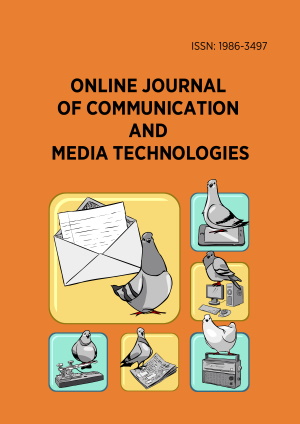Research Article
Journalism in the Age of Digital Technology
More Detail
1 DAIICT University, India* Corresponding Author
Online Journal of Communication and Media Technologies, 3(1), January 2013, 125-143, https://doi.org/10.29333/ojcmt/2414
OPEN ACCESS 4507 Views 18115 Downloads
ABSTRACT
The information age has created many challenges for every profession. In the case of journalism the introduction of information technology has altered considerably various aspects of the profession. The high tech revolution has significantly altered the way the public obtains its news and information, and has deprived the mass media of its traditional monopoly. This paper will explore intersections between new media, journalism and technology in order to enhance our understanding of the influence of information and communication technology, specially internet technology on traditional journalism. The media and the practice of journalism, however, have been slow to adjust to the Internet and the global ramifications produced by the new information technology. In the past decades, journalists in the Western World have benefited from the tremendous growth in information communication technologies – ICTs – and in the last ten years the ICTs have also penetrated the developing world and have made available computers, Internet access, and mobile technology. This development has probably eased journalistic working procedures in these parts of the world. Though journalists throughout the world still separate “domestic” from “foreign,” while their audiences casually chat between continents.
Today various computerized sources are regularly being used in media organizations. This paper investigates the adoption of information technology, three broad themes reflecting the role of the media in the digital age emerged from the Journalism, how journalists use these new tools to advance their profession, write for global audience and news gathering, the role of Internet; what the security and ethical implications are in this new realm; and whether freedom of the press necessarily means freedom of access, confusion created by new digital technologies and the power, speed and usefulness of digital creation, transmission and reception. This paper also considers that while the new digital platforms and technologies do present significant challenges to traditional journalism, they are also enabling technologies that offer opportunities to reinvigorate newsgathering. Although the future of journalism is a digital one, the core competencies of a good journalist will be as important as ever.
Today various computerized sources are regularly being used in media organizations. This paper investigates the adoption of information technology, three broad themes reflecting the role of the media in the digital age emerged from the Journalism, how journalists use these new tools to advance their profession, write for global audience and news gathering, the role of Internet; what the security and ethical implications are in this new realm; and whether freedom of the press necessarily means freedom of access, confusion created by new digital technologies and the power, speed and usefulness of digital creation, transmission and reception. This paper also considers that while the new digital platforms and technologies do present significant challenges to traditional journalism, they are also enabling technologies that offer opportunities to reinvigorate newsgathering. Although the future of journalism is a digital one, the core competencies of a good journalist will be as important as ever.
CITATION (APA)
Kaul, V. (2013). Journalism in the Age of Digital Technology. Online Journal of Communication and Media Technologies, 3(1), 125-143. https://doi.org/10.29333/ojcmt/2414

 The articles published in this journal are licensed under the CC-BY Creative Commons Attribution International License.
The articles published in this journal are licensed under the CC-BY Creative Commons Attribution International License.